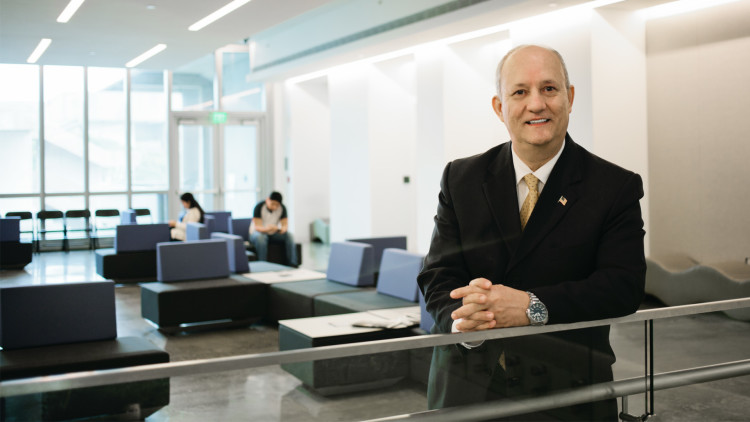There is a quiet dignity about Carlos Mejia. He arrives at this interview in a dark suit, wearing a white shirt and a pale, yellow tie, carrying a lawyerly looking briefcase. He looks as one would expect a lawyer to look. What one wouldn’t expect is that Carlos, who is in his mid-50s, is a recent MDC graduate and currently an intern with the U.S. Department of Housing and Urban Development.
“I am determined to become a lawyer and fight for civil rights. One of my dreams is to work for the Federal government in that area,” said Mejia. “That’s why this internship is perfect for me.”
Though he may not be the typical MDC student, Carlos represents an important segment of the student body–the returning student. He is also a laudable example of perseverance. At an age when many people would be starting to look toward retirement, Carlos is still on the upswing, climbing the ladder bit by bit, striving to better his situation.
“I’ve had a lot of difficulties in my life,” he says plainly. “But I’ve also had a lot of help and support from people like my mother who has been a great influence on my life, and also from people at MDC and HUD who have taken an interest in guiding me.”
“I would write down five verbs every day and learn to conjugate them.”
In Colombia, where he was born, Carlos was studying for his Bachelor’s in Economics but the university went on strike. In the midst of political turmoil and unable to complete his program of study, Carlos made his way to the U.S. with the intention to continue with his education. Once he got to the U.S., the demands of making a living took over. He taught himself English by buying the newspaper and puzzling over the words until he began to understand them. He would try to read every sign he saw. “I would write down five verbs every day and learn to conjugate them,” he said.
He also married, and raised three children. Eventually, he registered at MDC but had to discontinue his studies in order to focus on the demands of his family. The years quickly went by. He eventually divorced but stayed close to his ex-wife, their children and grandchildren. Then, as sometimes happens, a difficult challenge turns out to have a constructive flip side.
Carlos was involved in a bad car accident. This was a turning point. He had spent a lifetime providing for others by taking on a number of different jobs, including construction work. After the accident, he realized that given his age and his physical condition, he had to start using his brain instead of brawn to make a living.
“It’s complicated,” he says, “In the aftermath of my accident, I went through a lot of humiliation, profiling and discrimination. That’s when I thought — I’m not getting any younger, I’d better go back to college and finish my studies.”
He returned to MDC and finished his A.A. with a pathway to Criminal Justice Administration. He then moved on to complete his Bachelor’s, also at MDC, in Public Safety Management, focusing on the Criminal Justice track. He is now planning to attend FIU to continue with his plan to become a lawyer. But, before that, Carlos is interning with HUD.
HUD and MDC have an agreement in place to promote public service as a career goal. One of the ways they do this is through the internship program offered in the Fall, Spring and Summer terms. Interns work 20 hours a week in the local HUD office where they receive comprehensive, hands-on training in fair housing and related civil rights laws and regulations. They also investigate individual and systemic housing discrimination complaints.
Mejia’s title is Collegiate Intern with the Office of Fair Housing and Equal Opportunity. He’s supporting the investigators on staff with final investigation reports and document analysis. Among other duties, he also helps with Federal grants for organizations that are enforcing non-discrimination policies in housing. In addition, he is given the opportunity to receive virtual training in a number of areas such as Technical Writing.
“I’m working with professionals and assisting on actual civil rights cases.”
“I’m working with professionals and assisting on actual civil rights cases, much as a law clerk would. Not only is it very valuable experience in advance of starting law school, I also know it will look good on my resume and make me a more attractive job candidate.” Mejia refers to his time at HUD as “a beautiful experience” and has twice requested and been granted an extension of his internship.
Mejia acknowledges that because of his age, his accent and his background, he sometimes feels as if he might be at a disadvantage. But he waves it all away with one hand, “I just keep pushing,” he says. “Actually, I’m following in my father’s footsteps. He also went to law school late in life. He was 50 and had seven children when he got his law degree. He practiced his profession in Colombia for 30 years and had a number of positions in the courts, including being a criminal judge.”
Asked if he ever felt out of place studying with students who are so much younger than he is, Mejia responds, “I thought I was going to be ignored or stared at, but in fact, it’s been a sensational experience. Younger students are constantly coming up and engaging me in conversation. I think I might be an encouragement to them. They look at me and realize that if I can do it, they can do it.”
Want more information on HUD and other internship programs? Contact Matt Tanner, Director of Workforce Readiness & Internship Initiatives at mtanner@mdc.edu
